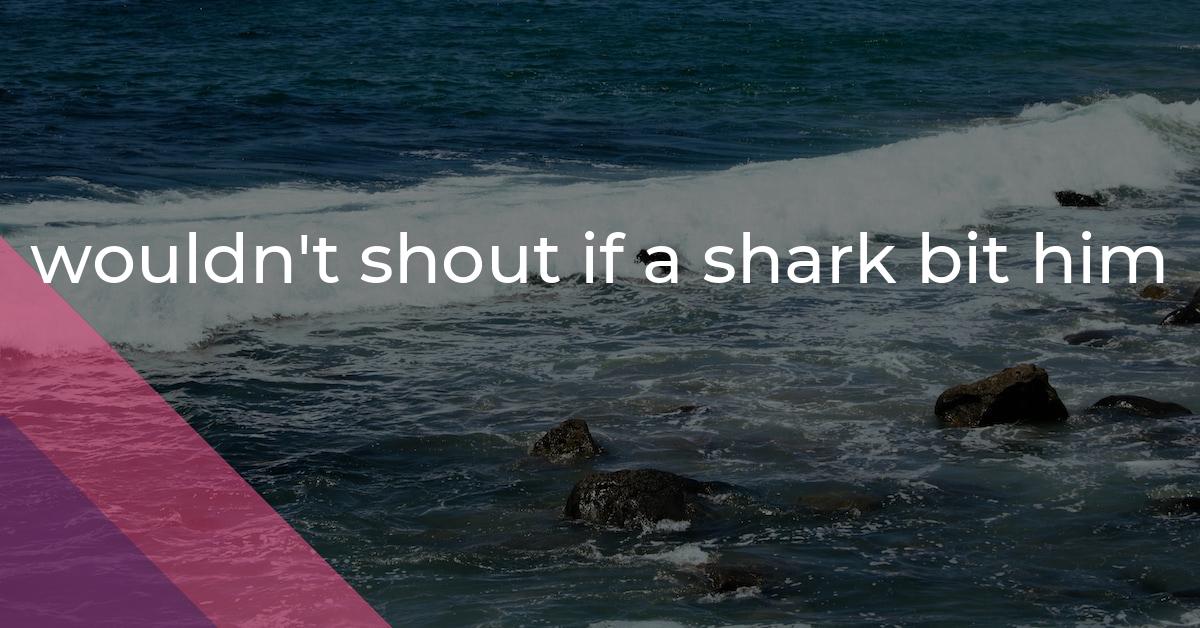wouldn’t shout if a shark bit him: Idiom Meaning and Origin
What does ‘wouldn't shout if a shark bit him’ mean?
The idiom "wouldn't shout if a shark bit him" means that someone is very quiet or unemotional, even in a dangerous or shocking situation.

Idiom Explorer
The idiom "wouldn't you say" is often used to seek agreement or confirmation from others about one's statement or opinion.
The idiom "wouldn't you know" is used to express a feeling of inevitability or irony about something that has happened. It implies that the outcome was expected or not surprising given the circumstances.
The idiom "swim with sharks" means to take part in a dangerous or risky situation, often involving powerful or ruthless people.
The idiom "shut one's mouth" means to stop talking or to keep quiet, usually in response to a command or to avoid saying something inappropriate or offensive.
The idiom "shut my mouth" means to remain silent or refrain from speaking, typically to prevent oneself from revealing a secret, expressing an opinion, or getting into trouble.
An idiom meaning extremely quiet or silent, like the sound a mouse makes when moving around. It is often used to describe a person, place, or situation that is not making any noise or is very still.
"Put up or shut up" is an idiom that means to either take action or remain quiet about a challenge or boast you have made. It implies that if you cannot back up your words with action, then it is better to say nothing at all.
The idiom "one's heart in one's mouth" means to be extremely anxious or fearful.
The idiom "one's bark is worse than one's bite" means that someone may sound or appear threatening, but they are not actually as dangerous or harmful as they seem.
Silent Response: A Fearful Encounter
While the origin of the idiom "wouldn't shout if a shark bit him" is unclear, it is widely used in the English language to describe someone who remains calm or unresponsive in a dangerous situation. The idiom implies that the person is so accustomed to danger that they are unaffected even by something as extreme as being bitten by a shark.
The idiom draws on the universally recognized fear and panic that a shark attack provokes in humans. Sharks are powerful predators that instinctively make us afraid. The idiom takes this fear and exaggerates it to illustrate just how unreactive the person is. The image of a shark bite encapsulates a life-threatening situation that would typically elicit a loud or fearful response from anyone else.
The phrase can be used to describe individuals who are unusually composed, unemotional, or unaffected by something that would normally provoke a reaction. It suggests a lack of empathy or concern, implying that the person is either extremely brave or completely indifferent to the danger at hand.
It is worth noting that this idiom is related to several other idioms that also convey a lack of emotion or response in different situations. For example, the idiom "butter wouldn't melt in someone's mouth" describes someone who appears innocent or good-natured on the surface, but may actually have a mischievous or cold-hearted nature. This idiom emphasizes how someone's reaction or outward appearance can be misleading, just like the person who wouldn't shout if a shark bit him.
Another related idiom is "wouldn't be seen dead" which is used to express extreme dislike or aversion to something. It implies that the person would do anything to avoid being associated with or involved in the disliked activity or item. Similarly, the person who wouldn't shout if a shark bit him may have such a disinterest or lack of concern that they wouldn't even react if they were in a dangerous situation.
A third related idiom is "bite one's lip" which means to stay quiet or hold back from saying something. This idiom suggests that the person is suppressing their emotions or opinions in order to maintain composure or avoid conflict. Similarly, the person who wouldn't shout if a shark bit him may be holding back their emotions or reactions in order to appear calm or unaffected by the situation.
The idiom "wouldn't shout if a shark bit him" has likely emerged from colloquial usage over time. The metaphorical association between a shark bite and lack of alarm reflects the cultural significance of sharks and their attacks being associated with fear and danger. However, identifying the specific origins of this idiom would require further research and investigation into its usage and earliest documented instances.
Regardless of its precise origin, this idiom remains relevant in contemporary language usage. It effectively conveys a specific sentiment and paints a vivid picture of someone's lack of reaction in a threatening situation. The idiom has become ingrained in everyday conversation, extending beyond its literal meaning and finding use across various contexts and discussions.
However, it is important to recognize that idioms can have different interpretations and connotations depending on the individual or cultural context. Personal experiences, regional variations, or changes in popular culture may influence the exact way in which this idiom is used or understood.
Ultimately, the idiom "wouldn't shout if a shark bit him" provides a memorable and evocative way to describe someone who remains calm and unflappable in the face of danger. While its specific origin remains uncertain, its enduring usage reflects the power of idioms to succinctly capture complex ideas and emotions.
Example usage
Examples of how the idiom "wouldn't shout if a shark bit him" can be used in a sentence:
- He is so calm and unaffected, he wouldn't shout if a shark bit him.
- Even during a crisis, she remains composed and wouldn't shout if a shark bit her.
- No matter how much pain he's in, he maintains a stoic demeanor and wouldn't shout if a shark bit him.
More "Neglect" idioms



